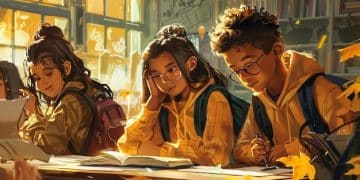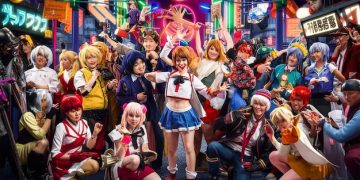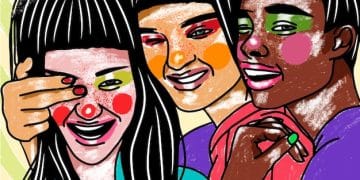The Impact of Shonen Manga: Themes, Influence, and Cultural Significance
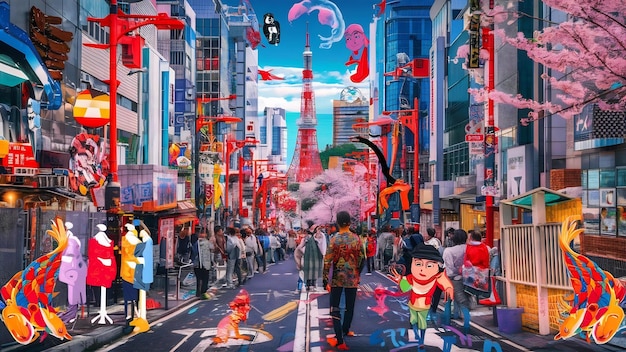
The impact of shonen manga extends far beyond mere entertainment, significantly shaping cultural values, inspiring creativity in diverse media, and fostering a global community of fans who resonate with its dynamic storytelling and universal themes.
The impact of shonen manga is undeniable, influencing generations with its tales of friendship, perseverance, and adventure. But how profound is this impact, and what facets of society does it touch?
Understanding Shonen Manga: More Than Just Entertainment
Shonen manga, characterized by its action-packed storylines and themes of growth, isn’t simply a form of leisure. It’s a genre that resonates deeply with its audience, providing a lens through which they explore concepts of morality, ambition, and camaraderie.
Defining Characteristics of Shonen Manga
Shonen manga typically features a young male protagonist who embarks on a journey, overcoming challenges and developing his abilities. These narratives often incorporate humor, strong emotional resonance, and intricate battle sequences.
The core themes of shonen manga frequently include:
- Friendship (nakama): The importance of bonds and teamwork.
- Effort (doryoku): The value of hard work and perseverance.
- Victory (shouri): Achieving goals and overcoming obstacles.
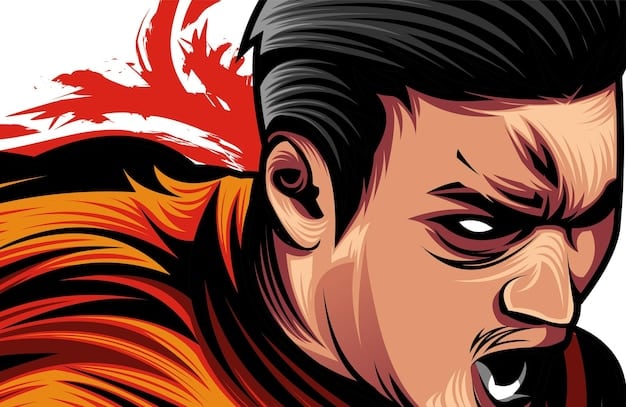
The Psychological Appeal of Shonen Manga
The popularity of shonen manga can be attributed to its ability to tap into fundamental human desires. The themes of striving for self-improvement, protecting loved ones, and achieving greatness resonate with readers on a deeply emotional level.
The narratives often provide a sense of hope and escapism, allowing audiences to immerse themselves in worlds where anything is possible with enough determination and support.
Shonen manga’s impact extends beyond entertainment, offering valuable life lessons and fostering a sense of community among its fans.
The Impact on Cultural Values: Shaping Ideals and Aspirations
Shonen manga has subtly but powerfully shaped cultural values by promoting certain ideals and aspirations. These narratives often reinforce positive values such as loyalty, bravery, and the importance of striving for a better future, influencing how young readers perceive the world and their role within it.
Promoting Positive Values and Morality
Many shonen manga series emphasize the importance of doing what is right, even when faced with difficult choices. Characters often grapple with moral dilemmas, demonstrating the complexities of ethical decision-making.
Examples of moral themes often explored include:
- Justice: Fighting for what is fair and equitable.
- Compassion: Showing empathy and understanding towards others.
- Self-sacrifice: Putting the needs of others before one’s own.
Inspiring Ambition and Self-Improvement
The protagonists in shonen manga are frequently depicted as individuals with lofty goals and unwavering determination. Their journeys inspire readers to pursue their own ambitions and to strive for self-improvement.
This inspiration is evident in the real-world aspirations of many fans, who are motivated to:
- Set ambitious goals: Aiming high and working towards significant achievements.
- Develop new skills: Putting in the necessary effort to acquire expertise.
- Overcome challenges: Persisting despite obstacles and setbacks.
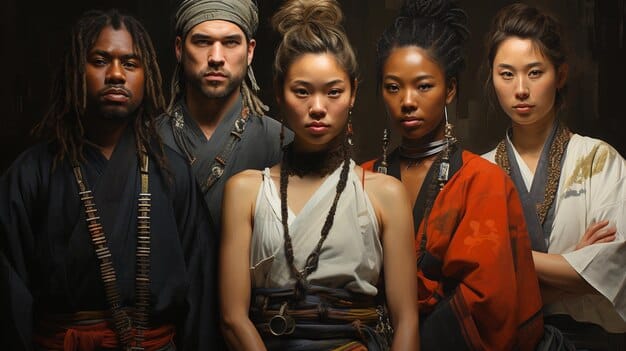
The Impact on Interpersonal Relationships
Shonen manga often highlights the importance of strong interpersonal relationships, particularly friendships. The bonds between characters serve as a model for real-world relationships, emphasizing the value of trust, loyalty, and mutual support.
The focus on teamwork and collaboration encourages readers to build strong connections with others, fostering a sense of community and belonging.
Shonen Manga’s cultural impact is significant, promoting positive values, inspiring personal growth, and strengthening interpersonal relationships.
Influence on Global Media: From Anime to Live-Action Adaptations
The influence of shonen manga extends far beyond the pages of comic books, permeating various forms of media worldwide. Its dynamic storytelling, memorable characters, and universal themes have inspired countless adaptations, shaping the landscape of global entertainment.
The Proliferation of Anime Adaptations
Anime adaptations of shonen manga are incredibly popular, often reaching a broader audience than the original manga series. These adaptations bring the stories to life with vibrant visuals, dynamic animation, and captivating soundtracks.
Notable examples of successful anime adaptations include:
- Naruto: A ninja’s journey to achieve recognition and protect his friends.
- One Piece: A pirate’s quest to find the ultimate treasure.
- Dragon Ball: A Saiyan’s battles to protect the Earth from powerful villains.
Impact on Video Games and Other Interactive Media
Shonen manga has had a significant impact on the gaming industry, with numerous titles adapted into video games. These games allow players to immerse themselves in the worlds of their favorite characters and storylines.
The interactive nature of video games provides a new level of engagement, allowing fans to:
- Experience iconic battles: Reliving memorable moments from the manga and anime.
- Explore vast worlds: Discovering new characters and locations.
- Customize character abilities: Personalizing their gameplay experience.
The Rise of Live-Action Adaptations
Live-action adaptations of shonen manga are becoming increasingly common, with both domestic and international productions gaining popularity. These adaptations bring the stories to life in a new and visually compelling way.
While live-action adaptations can be challenging to execute, successful examples demonstrate the enduring appeal of shonen manga’s narratives.
Shonen Manga’s widespread adaptability has solidified its prominent position in the global media landscape.
Fostering a Global Community: Fan Culture and Conventions
Shonen manga has fostered a vibrant global community, uniting fans from diverse backgrounds through their shared love of the genre. This community manifests in various forms, from online forums and fan clubs to large-scale conventions and cosplay events.
The Role of Online Communities and Forums
Online communities and forums provide a space for fans to connect, share their thoughts and theories, and discuss their favorite series. These platforms are crucial for:
- Disseminating information: Keeping fans up-to-date on the latest news and releases.
- Facilitating discussions: Encouraging debate and analysis of storylines and characters.
- Promoting fan creativity: Showcasing fan art, fiction, and other creative works.
The Significance of Conventions and Cosplay Events
Conventions and cosplay events offer fans the opportunity to meet in person, celebrate their shared passion, and express their creativity through elaborate costumes and performances.
These events provide a sense of belonging and community, allowing fans to connect with like-minded individuals and to immerse themselves in the world of shonen manga.
The Economic Impact of Fan Culture
The global community surrounding shonen manga has significant economic implications, driving demand for merchandise, adaptations, and events. The industry generates billions of dollars annually, supporting a wide range of businesses and creators.
The economic impact demonstrates the enduring popularity and cultural significance of shonen manga on a global scale.
Fan culture and conventions play an integral role in galvanizing a community that propels shonen manga’s influence to new heights.
Criticisms and Limitations: Addressing Concerns and Controversies
While shonen manga has had a profound impact on culture and entertainment, it is not without its criticisms and limitations. Concerns have been raised regarding the portrayal of certain themes and character archetypes, as well as the potential impact on young audiences.
Common Criticisms of Shonen Manga
Some of the most common criticisms of shonen manga include:
- Stereotypical gender roles: The portrayal of female characters as damsels in distress or as lacking agency.
- Excessive violence: The graphic depiction of violence and its potential desensitizing effect on viewers.
- Overreliance on clichés: The use of predictable plot devices and character tropes.
Addressing Concerns About Representation
Concerns about representation in shonen manga have led to calls for greater diversity and inclusivity. Creators are increasingly encouraged to develop characters that reflect the diversity of the real world and to challenge traditional gender roles.
Efforts to promote diversity and inclusivity can help to make shonen manga more accessible and relevant to a wider audience.
The Importance of Critical Engagement
It is important to engage with shonen manga critically, acknowledging its strengths while also being aware of its limitations. By analyzing the messages and themes presented, audiences can develop a more nuanced understanding of the genre and its impact.
Critical engagement fosters a more informed and responsible consumption of media, promoting a healthier relationship with the content.
Acknowledging these criticisms is crucial for fostering a balanced understanding of shonen manga’s role in society.
The Future of Shonen Manga: Trends and Innovations
The future of shonen manga is likely to be shaped by emerging trends and technological innovations. As the industry evolves, creators will continue to experiment with new storytelling techniques and formats, pushing the boundaries of the genre.
Emerging Trends in Shonen Manga
Some of the emerging trends in shonen manga include:
- Greater focus on diverse characters and storylines: Reflecting the increasing demand for inclusivity and representation.
- Incorporation of social and political themes: Addressing real-world issues and promoting social awareness.
- Experimentation with new art styles and formats: Exploring innovative approaches to visual storytelling.
The Impact of Digital Platforms and Streaming Services
Digital platforms and streaming services are playing an increasingly important role in the distribution and consumption of shonen manga. These platforms provide greater accessibility and convenience for fans, as well as new opportunities for creators to reach a wider audience.
The rise of digital media has led to:
- Increased availability of manga and anime: Making it easier for fans to access their favorite series.
- New forms of interactive storytelling: Allowing readers to engage with the narrative in a more immersive way.
- Greater opportunities for independent creators: Providing a platform for emerging artists to showcase their work.
Potential Challenges and Opportunities
The future of shonen manga also presents potential challenges and opportunities. The industry must adapt to changing consumer preferences and technological advancements, while also addressing criticisms regarding representation and content.
By embracing innovation and fostering a more inclusive and responsible approach, shonen manga can continue to thrive and to have a positive impact on audiences around the world.
The future looks promising, with shonen manga poised to continue its evolution and global outreach.
| Key Aspect | Brief Description |
|---|---|
| 🌟 Cultural Values | Promotes values like friendship, effort, and victory. |
| 🎬 Media Influence | Inspired anime, video games, and live-action adaptations. |
| 🌍 Global Community | Fosters a vibrant fanbase through conventions and online forums. |
| 🤔 Criticisms | Faces concerns about gender roles and violence. |
FAQ
▼
Shonen manga is primarily targeted at a young male audience, featuring action-oriented plots, dynamic characters, and themes such as friendship, perseverance, and achieving victory. It often includes humor and emotional depth.
▼
Shonen manga’s compelling storytelling and character designs have inspired numerous anime adaptations, video games, and live-action films. Its universal themes appeal to a broad, international audience and media landscape.
▼
Shonen manga frequently emphasizes values such as friendship, teamwork, the importance of hard work, and dedication to achieving one’s goals. These positive attributes resonate with readers and help instill moral principles.
▼
Criticisms include stereotypical gender roles, excessive violence, and a reliance on clichés. Some argue female characters are often underdeveloped, and the intensity of action can be overwhelming or desensitizing for younger viewers.
▼
Shonen manga brings fans together through online communities, fan conventions, and cosplay events. These platforms allow fans to share their passion, discuss theories, creativity to their manga, and form lasting friendships around this shared interest.
Conclusion
In conclusion, the pervasive influence of shonen manga extends deeply into various aspects of global culture. From shaping cultural values and inspiring media adaptations to fostering global communities, the genre has left an enduring mark. While criticisms persist, its impact is undeniable, continually evolving with emerging trends and innovations, ensuring its place in the world’s cultural fabric for years to come.
